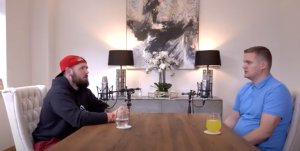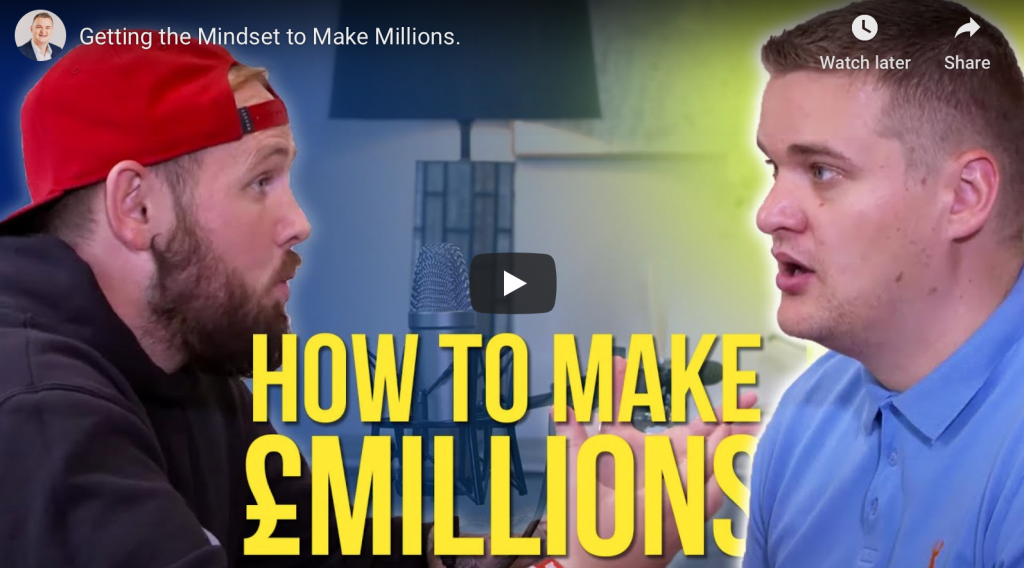How to Get a Millionaire Mindset
“An investment in knowledge pays the best interest,” Benjamin Franklin.
Over the years, I have accumulated a lot of financial knowledge that has led me to reap great benefits. Knowledge that I use to educate people like yourself on how to achieve financial freedom. I sat down with motivational speaker Cameron Parker to discuss my journey, and how thinking like a millionaire eventually saw me become one.
Cameron first wanted to know what, if any, challenges did I face growing up that motivate me today. I explained that I used to perform poorly back in my school days. Eventually, I stopped putting in any effort in my studies because if I'd never get good grades, what was the point of trying? And to top it all off, it was as if the teachers had given up on me as well. I felt that I wasn’t understood.
I attended this small Christian school in Warsaw from ages 6 to 16. And I remember that I enjoyed being in conflict with others because I thrived in such settings. For instance, when going home, my schoolmates would take their blazers and ties off to avoid squabbles with students from other schools because of wearing a different colour uniform. But I insisted on wearing mine, knowing very well I'd get picked on.
I'd even go so far as to say I enjoyed fighting. “Why?” you ask? Well, Cameron also wanted to know the reason behind my confrontational nature. “I think it was the only thing I was good at in school … I was good in that setting,” I tried to explain. It was like I was trying to console myself that although my academic performance was lacking, I could at least throw a proper punch.
“Interesting,” Cameron responded, before asking what my parents thought about my approach to school. I disclosed that my parents split up when I was seven, and it wasn't exactly amicable because “they were cussing each other out and stuff.” And while I got to see my dad regularly, he wasn't involved in my education. My mom, on the other hand, I remember, would almost always side with me whenever I got in trouble in school.
A case in point is when I was suspected of dealing drugs in school when, in reality, I was selling magic tricks. My dad was a magician, and I'd buy the magic tricks from his market at a wholesale price then sell them to my schoolmates at retail prices. So my teachers called in my mom to tell her I might be selling drugs and “she was like no he's not selling drugs.” “I don't think he is anyway,” Cameron adds jokingly.
Aside from selling magic tricks, I engaged in other entrepreneurial activities like doing paper runs and washing cars. And I used to make a lot of money, “I was good at it.” Or as Cameron put it, I had little to no control over how I performed in school, but there were certain things I could control, making money, for instance. And so I did more of what earned me a few quids here and there.
But being a 15-year-old making such kind of money, the banks, like the teachers, were suspicious. The thought that I could perhaps be an entrepreneur while still in school didn't even cross their minds. And this led to my next point of discussion with Cam. “The education system does not teach money … and business,” I pointed out, “schools often teach compliance rather than thinking outside the box.” So where does that leave students that naturally have an entrepreneurial flair?
“I think, from my experience, it all depends on the school,” Cameron responded, “there are some schools who have put money and funding behind students going out and trying to learn different things.” He continued to say, “they would probably want to teach more money, but … there are so many restrictions.” I couldn't agree more. There are many exemplary teachers and schools out there, “but you can't have it (money) in the curriculum.” It's almost as if you're “banned from teaching money … it's ludicrous.”

We go to school to get an education, which will, in turn, help us get good jobs. “And what's the point of a job?” I asked Cameron rhetorically, “to get money.” Doesn't it then make more sense to skip all that and teach our children money straight? Cameron responded by saying
he talks quite a lot about money to students. And what he has realized from these talks is that most students have “champions league expectations” but “Sunday league work ethic planning and preparation.”
“So sometimes we gotta teach them the tools and the strategies and the work ethic” as well because some kids think they can get more by doing less. Cameron went on to tell me that his biggest challenge as a motivational speaker is getting students to see that their efforts don't measure up to the goals they've set. My response to that was that kids first need to understand that creating and following a plan is necessary for achieving any goal.
“Why is setting goals and a plan important?” Camerons asked. Having a goal without a plan is like playing football without knowing the objective of the game. If the players don't know they are supposed to kick the ball over the opponents' goal line, they'll just run around aimlessly. “And that's what people do … that was me at school,” I tell him after giving the football analogy, “you need to have a goal.”
Cameron agreed, adding that he always tells kids,”You never want to be one of these adults who spend more time planning a holiday than they do their own lives.” The type to plan a wedding but not a marriage, I added in agreement. “Wow … dive into that more please.” People tend to care so much what others think that they give a lot of time and thought in planning a picture-perfect wedding and not nearly as much in planning their marriage. “And it's the same with everything,” I continued to explain, “People plan the baby shower … and the christening … rather than how to bring up the kid.”
“That's fascinating,” Cameron commented before asking what have been some of the biggest challenges I have faced building my property portfolio, starting my training company, and life in general. “There's been so many,” I answered, but impatience was the first thing to come to mind. “Sometimes there are things that just do take time … you want to lose weight, it's a journey. You want to become a millionaire, it's a journey. And as entrepreneurs, we want things fast. So that for me is sometimes a challenge.”
“I think another thing is um, being misunderstood—” “I think you're massively misunderstood as well,” Cameron interrupted me, which I didn't mind because he proceeded to give me complement after complement. “People criticize you a lot but all you do is keep bouncing back … you're so resilient … here's people who are actively trying to go out and destroy you and you just use it … and keep bouncing back … and I have to admire it.”
He then asked where my drive to keep moving forward and not let what people say get to me comes from. “I think all my life I've been misunderstood,” I tell him, so “I'm quite okay with that, and I'm also quite okay not being liked.” For me, it's all about what I intend to achieve. The goal of my training company, for instance, “is to see people's lives and finances revolutionized … the goal is not for me to be liked.” And another thing that helps me stay focussed and to press on is my strong faith.
So, all in all, I wouldn't say I bounce back because “I don't even feel like I got knocked down.” All that criticism is “water off a duck's back for me.” “Is that 100% real though?” Cameron wanted to know, “because I'll be honest … I'm quite sensitive.” “I mean listen,” sometimes people cross the line, for instance, bringing up my family. “But getting criticized and stuff online is—” “Part of the process.” “—that's part of the process!”
“Here's the thing right Cam, I'm trying to change the way people think. I'm trying to open people up into a whole new world of thinking around finance and around what they can achieve.” Anyone that helped change the world in history by changing the way people think was ridiculed at some point. “Gandhi … Martin Luther King, Jesus. I mean, they crucified Jesus. So how can you expect to be a pioneer for something, be a business leader, and be changing the way people think and not be ridiculed?
Share this video: https://youtu.be/WQGPnb_xtZE
🎥 How to build a property portfolio from scratch in 7 DAYS: https://youtu.be/RWEkj1y8XKs
📖 My favourite book: https://amzn.to/39VcYLa
❓ Have a question about property? Join my Property Facebook Group: https://www.facebook.com/groups/77861…
🗣️FOLLOW ME ON SOCIAL MEDIA:
Instagram: https://www.instagram.com/leeds.samuel
Facebook Group: https://www.facebook.com/groups/77861…
Facebook Page: https://www.facebook.com/OfficialSamu…
Twitter: https://twitter.com/samuel_leeds
LinkedIn: https://www.linkedin.com/in/samuel-le…





